Why We Built a Hub for Vetted Vaccination Resources for Public Schools
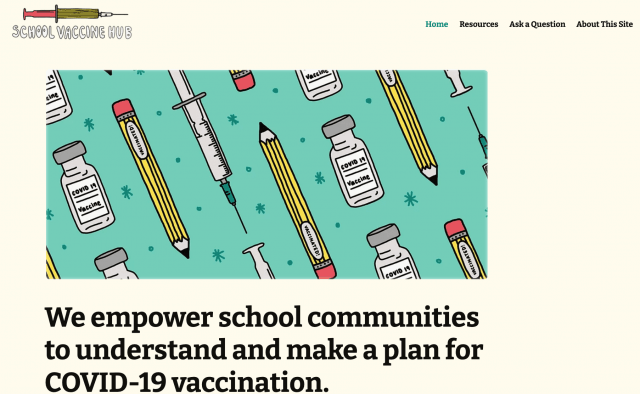
By L. Arthi Krishnaswami, Eric Tucker, and Erin Mote
Now more than ever, trusted resources are as good as gold. More than a year of uncertainty with the COVID-19 pandemic, during which some elected officials pilloried scientists for speaking truth, left a lot of people confused, skeptical, and distrustful. But now that the COVID-19 vaccines are available at scale, it’s imperative that society build back that confidence and trust in science again so more people feel comfortable getting a vaccine.
But how do we do that? People crave facts. They desire actionable health insights. They seek confidence in the notion that they can rely on official information.
As society looks to vaccinations to help us achieve herd immunity and get to the other side of this pandemic, Brooklyn Laboratory Charter Schools (LAB) and EquityByDesign.org have teamed up to develop the School Vaccine Hub—a free, online resource that empowers K-12 educators to help local school communities understand and manage plans for COVID-19 vaccinations. This centralized platform offers credible vaccine information and accompanying curriculum and tools that schools can use to promote the uptake of COVID-19 vaccinations, and address fears and concerns about vaccines in America’s diverse public-school communities. Some of the resources are translated into languages beyond English, including Spanish, Mandarin, Arabic, and Korean.
Central to this project is the idea that schools can advance vaccination equity by making trusted information available from trusted local community leaders. This local approach will help communities overcome vaccine hesitancy to defeat COVID-19, while giving schools a vital role to play in rebuilding public trust.
Our team—including colleagues from a host of leading health and education organizations— identified and vetted over 400 trustworthy resources from more than 350 different entities; the Hub hosts 75 of the most relevant, highest-quality resources. We vetted each of these resources against a rubric we developed earlier this year.
The Hub is connected to the broader Educating All Learners Alliance (EALA) effort to share trustworthy, evidence-backed solutions that helped schools reimagine a safe approach to in-school, remote, and hybrid school during the pandemic. EALA placed an emphasis on ensuring the continuity of special education services during remote instruction, spotlighting best practice approaches for schools and educators across the country. Like the Hub, EALA prioritizes equity above all else.
Anatomy of a Hub
The School Vaccine Hub concept began to take form in December. As the national conversation around vaccines gained momentum, we noticed that no one was providing a coordinated set of trusted resources for schools and educators.
By February, we started collecting these materials from credible, non-partisan sources such as the U.S. Centers for Disease Prevention and Control, the National Institutes of Health, the Food and Drug Administration, and the World Health Organization. We sought data from public health institutions such as Johns Hopkins University and Children’s Hospital of Philadelphia. Then we broadened the search to include independent journalism projects from media organizations such as CNN, NPR, ProPublica, The Atlantic, Quartz, the New York Times, and the 19th.
We also teamed up with the COVID Collaborative, a national assembly of leading experts and institutions that has partnered with the Ad Council to create a COVID-19 vaccine public education campaign.
We added content from respected institutions, with information such as vaccine comparison overviews from Yale Medicine, state-by-state data vaccination data from Our World in Data, and “COVID-19 Vaccination Communication: Applying Behavioral and Social Science to Address Vaccine Hesitancy and Foster Vaccine Confidence” from the National Institute of Health.
Brooklyn LAB co-developed curricular resources for the Hub that are intended to engage students, too. “Teachers can use these lesson plans to empower students with science-based facts about the risks of the virus and the efficacy of the vaccine to encourage impactful conversations with family members and others who may be hesitant to get vaccinated,” said Max Koltuv of SOAR Education Partners, who worked with LAB to develop the curriculum.
Les Lynn, director of Argument-Centered Education, created a debate unit curriculum, especially for the School Vaccine Hub. “This mini-unit is designed to teach students about COVID-19 vaccine hesitancy, its sources, and solutions criticality, through the lens of evidence-based arguments,” said Lynn. “Students will have the chance to research, write, analyze, respond to, and evaluate arguments made on vaccine hesitancy from across the spectrum.”
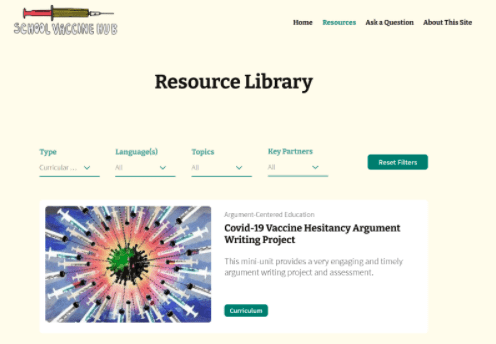 Over the course of two months, we whittled down these resources to several dozen of the highest impact, free items. As the dataset grew, we began to develop a rubric by which to measure and evaluate the resources we had pulled.
Over the course of two months, we whittled down these resources to several dozen of the highest impact, free items. As the dataset grew, we began to develop a rubric by which to measure and evaluate the resources we had pulled.
What’s next
We have designed the School Vaccine Hub to be organic and grow over time. Our goal is to feature the most relevant, current information on the COVID-19 vaccine to support equitable access to information for school communities. As vaccines become available for younger people, we will continue to review data and share it. We expect to add new material to the Hub in the weeks and months ahead.
We have also invited schools, medical institutions, media platforms, and public health entities to nominate curricular tools, articles, videos, or other resources to share on the Hub.
All told, the School Vaccine Hub will reach thousands of schools through a distribution partnership with more than 80 educational organizations from the EALA, including the National Center for Learning Disabilities, the Center for Learner Equity, InnovateEDU, Digital Promise and ISTE. We look forward to seeing schools embrace the resource, and hope it will empower them to address hesitancy and spearhead vaccination efforts in their respective communities.
For more see:
- How Schools Can Promote Vaccination and Address Hesitancy: A 10-Point Plan that Puts Equity First
- Meeting the Challenge of Reopening: How Laboratory School Communities Can Power Human-Centered Design and Inclusive Innovation
- How to Reopen Schools: A 10-Point Plan Putting Equity at the Center
- To Reopen, America Needs Laboratory Schools
- Preparing to Reopen: Six Principles That Put Equity at the Core
- Reopening Schools: A Scheduling Map for Educators to Plan the Who, What, When, Where, and How of Learning this Fall
- How We Move Forward: Practicing Three Inclusive, Anti-Racist Mindsets for Reopening Schools
- Schools Need a Success Coach for Every Learner
- Preparing for a Healthy and Safe Return to School: Public School Facilities Planning in the Era of COVID-19
- Educating All Learners Alliance Launches Flagship Site, Shares Personas Educators Can Use to Understand Students’ Lived Experience During COVID-19
- Five Principles to Help Provide Our School Communities With the Communications They Deserve
L. Arthi Krishnaswami is the founder of the Community Success Institute and an adjunct professor at Carnegie Mellon University in Pittsburgh
Stay in-the-know with innovations in learning by signing up for the weekly Smart Update.
Guest Author

Eric Tucker
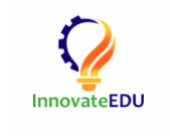


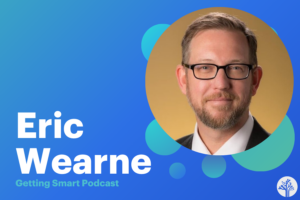

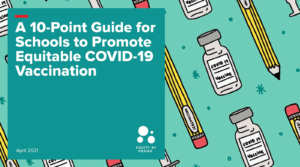
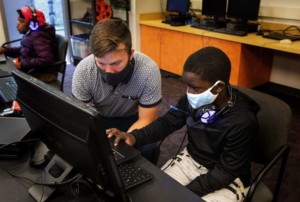

0 Comments
Leave a Comment
Your email address will not be published. All fields are required.